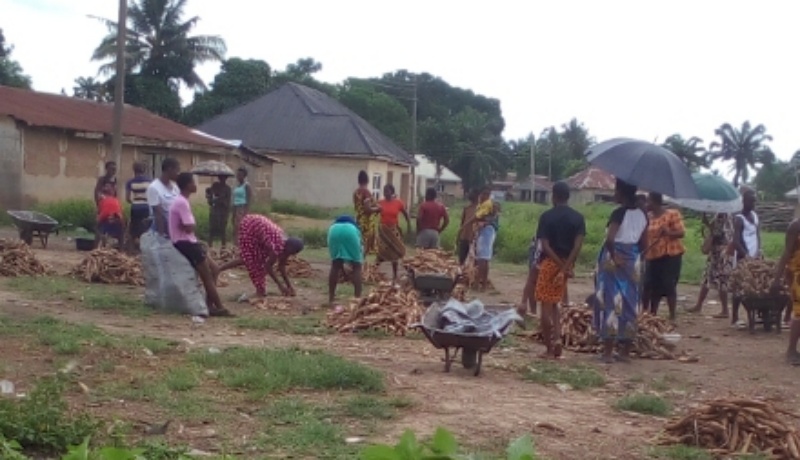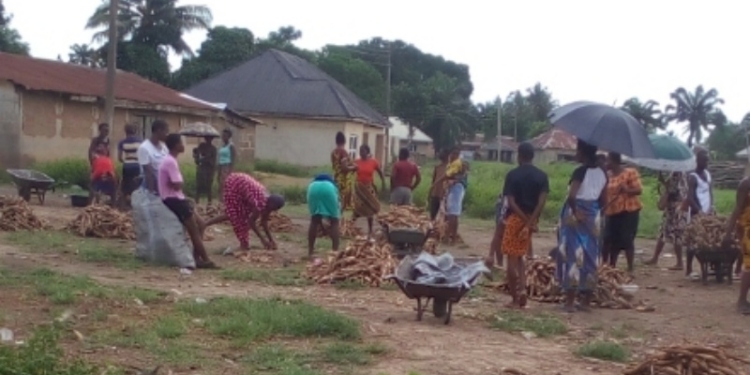- Prices of cassava, other food items take a meteoric al rise
- Farmers, experts blame insecurity, high cost farming chemicals on high cost of cassava
- Cassava farmers, others appeal to govt on incentives
The soaring prices of goods and services in Nigeria has visited cassava markets across the federation. Cassava is one of the most popular staple foods in Nigeria, accounting for over 30% of foods being consumed by Nigerians.
Cassava is said to have by-products like garri, cassava flakes, flours(which is used for fufu and breads).
Medically, cassava is also used for syrups for medical treatment.
In any case, with low production of the product, the price has continued to soar high amid harsh economic situation in the country.
Why the high cost of cassava in the market?
Farmers in various parts of Nigeria especially in the south East zone have attributed the increasing cost of cassava to so many factors.

Mr. Charles Ezugwu, a well known cassava farmer from Nkpunator village in Nkpologu community, Uzo-Uwani local government area of Enugu state told WITHIN NIGERIA that the high cost of cassava is partly as a result of insecurity in the zone.
” I am a cassava farmer. I have more than five hectares of cassava ready for harvest. But right now, I cannot go there and do the harvest.”
Narrating further, Mr. Ezugwu explained that ” the last I went there was in November last year. That day, I nearly lost my life to the attack by Fulani herdsmen. These herdsmen have literally taken over our cassava farm in remote places in our community.
” As I speak with you now, I have not cultivated any cassava and I don’t even have the intention to do that because, I don’t want to loose my life to the armed herdsmen attack in the farm.”
Apart from insecurity in the zone, there is also the issue of high cost of labour and chemicals for the cultivation of the product.
Matthew Onah, is also a commercial cassava farmer at Ugwuogo Nike, Enugu state. He told our reporter that one of the reasons for the high price of cassava is as a result of neglect on the cultivation of the crop.
According to him, many farmers abandoned cassava which according to him was not giving them much financial returns to cultivate yams and rice.
“Many farmers thought that cassava farming was not a profitable venture. Two years ago, you can hardly see a farmer who engaged in commercial cassava farming in this area.

” But today, the story has started changing gradually at the expense of the citizenry. Cassava is now a much sought after food in this area so much so that the price has skyrocketed so much so that many people can no longer afford it.”
A visit to the cassava market
When our reporter visited one of the cassava markets at Adani, Uzo-Uwani local government area of Enugu state, it was indeed a shadow of its former self.
At about 10am on Wednesday, there was just few cassava who seen at the market, even as many buyers were still hanging around, thinking and wishing that the price of the product will come down.
A farmer who gave her name as Fidelia told WITHIN NIGERIA that the price has been on the increase since four months ago.
” Before now, the price of wheelbarrow full of cassava was sold at N10,000. But today, you can see that there is just few sellers here with a handful of cassava. The price has jumped from N10,000 to N30,000. It is not funny but very unfortunate. I am a farmer but we are not finding it funny.”
Asked what could likely be the cause of the price hike, Fidelia said that ” for now, cassava farmers and indeed majority of the farmers no longer go their farm in this part of the world. If you go to your farm which is in a remote area, you are either kidnapped for ransome by abductors or get killed by Fulani herdsmen. So, either way, it is devil’s alternative which nobody wants to take.”
Narrating further, the mother of three told our reporter that ” many farmers have plenty of cassava inside the farms but they are afraid to go there and harvest them because of security issue.”
At garri market in Nsukka in Enugu state, our reporter equally gathered that the situation is really becoming unbearable.
One milk cup of garri is sold between N200 and N250 depending on the quality of the said garri something that was sold at N120 and N150 in January this year. A painter of white garri which contains 24 milk cups is sold at N3500 and N3800 which was N1500 in January 2024.
Nigeria should embark on aggressive yam, cassava production —Abia monarch
However, as the cassava and other farm products continue to be out of reach of many Nigerians, former South East Coordinator, Nigerian Cassava Growers Association, NCGA, and the traditional ruler of Oriendu Autonomous Community, Umuahia North Local Government Area, of Abia State, HRH Eze Philip Ajomuiwe, has also thrown his weight behind the call by renowned Economist, Dr Dele Sobowale, for Nigeria to better embark on massive production of yam and cassava where it already has the comparative advantage as the world’s largest producers.
The monarch who is also the First National Deputy President of Nigeria Cassava Processors and Marketers Association, told newsmen recently in Umuahia, that aggressive investment in agriculture especially crops where the country has a comparative advantage, remains the surest way for Nigeria to overcome its current economic hardship.

According to the monarch, “it’s not in doubt that Nigeria, followed by Brazil, is the world’s largest producer of cassava. Then for Nigeria to sustain its position as the world’s leading producers of yam and cassava, the Government must equip the youths to go into mechanized farming. The era of going to farm with hoes and machetes is over.
“The government, both Federal and State, should immediately and responsibly provide the needed incentives and support for our youths to go into massive mechanised yam and cassava farming.
“The youths should be provided with large acres of land for cassava and yam production. Cassava is used for so many products including starch, flour, ethanol, fufu, animal feed, etc. The government should provide improved seedlings and tractors.”
Explaining further, the monarch said that, “if we begin massive production of yam and cassava, we will begin to export chips, flour, starch and other byproducts”.
He however, noted insecurity and constant displacement of farmers by herdsmen as a major drawback to the actualisation of the dream.
According to him, “Government should do everything to tackle insecurity and ensure the safety of our farmers. We cannot talk about food security when farmers are still squatting in IDP camps. The government should deal with the killer herdsmen displacing farmers so that farmers can return to the farm. Until the issue of insecurity and incessant raids of agrarian communities by herdsmen and bandits are tackled, every talk about food security is cosmetic. The killing of farmers is still going on in Benue and Plateau States, the major food basket of the country.”




Discussion about this post